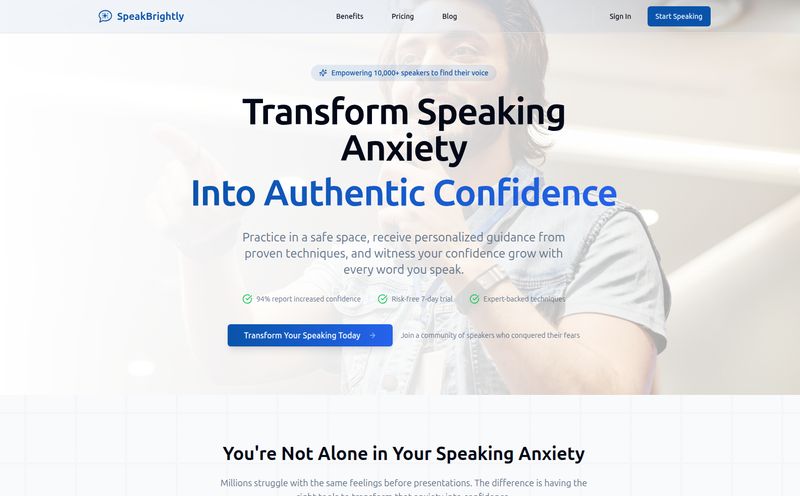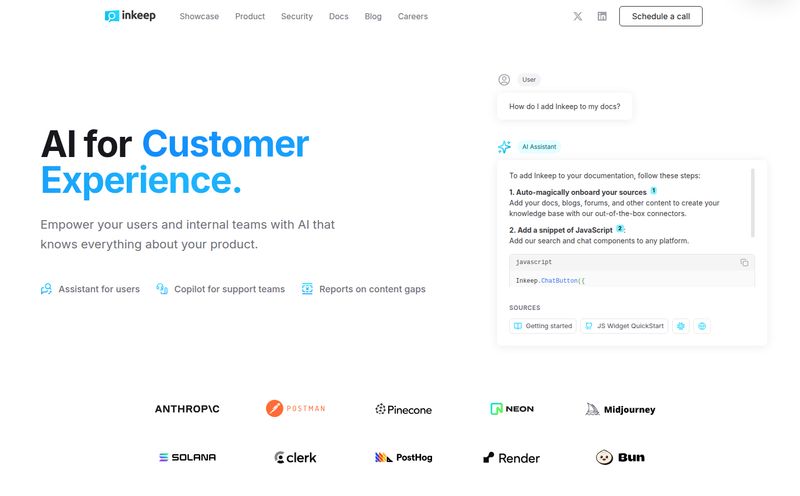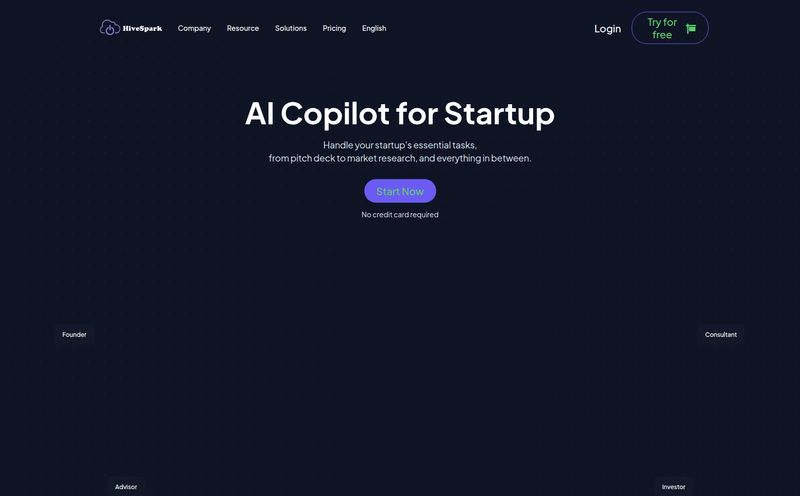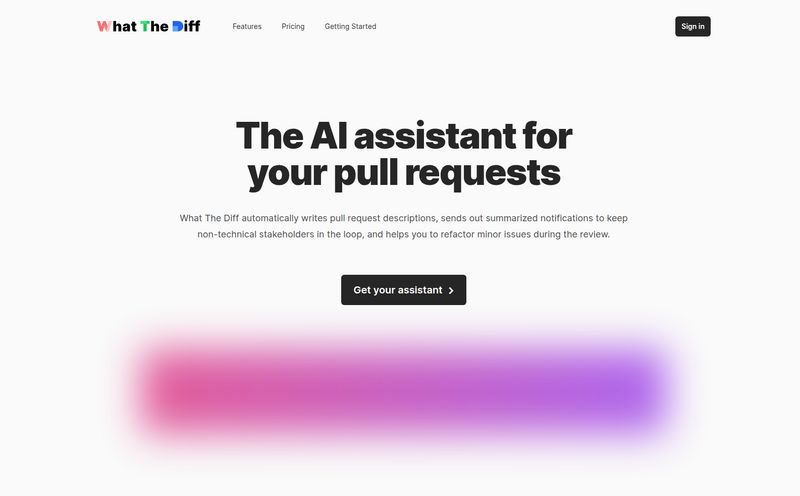Product meetings. We've all been there. It’s that feeling you get when the calendar alert pops up for a two-hour ‘Product Strategy Sync’ that you know might just be a chaotic mess of half-baked ideas and action items nobody will remember. You brainstorm, you debate, you whiteboard until your hands are stained with marker ink. And then… the meeting ends. The real work begins: deciphering your own cryptic notes to write up the epics, the user stories, and all that glorious documentation.
It’s the necessary evil of product management. The administrative black hole that sucks up precious hours you’d rather spend, you know, actually innovating.
So, when I stumbled across a new tool called Klofa, my curiosity was definitely piqued. Billed as an "AI copilot for product teams," it promises to sit in on your meetings and do the heavy lifting. A bold claim. One I've heard a few times before in this AI-crazy era. But let's be real, any tool that promises to save me from documentation dread is worth a closer look.
So, What Exactly is Klofa?
Think of Klofa as a hyper-efficient, AI-powered junior product manager or scribe who joins your online meetings. Its one and only job is to listen to the discussion—the feature requests, the user feedback, the wild ideas—and then, almost like magic, suggest pre-written epics and user stories. The goal is to bridge that massive gap between conversation and a well-structured product backlog.
Instead of you spending an afternoon translating a messy transcript into actionable tasks, Klofa aims to have them ready for you. It’s not about replacing the product manager; it's about augmenting their abilities. It’s like having a sidekick who handles the tedious paperwork so you can focus on steering the ship. I’ve always said the best tools don’t do your thinking for you, they just clear the path so you can think better. This seems to be Klofa's philosophy.

Visit Klofa
How Klofa Wants to Change Your Workflow
The promises are big, and they directly target the pain points that keep PMs and their teams up at night. It's not just about one feature, it's about shifting the whole dynamic of product planning.
From Brainstorm to Backlog, Instantly
This is the core value proposition. The most soul-crushing part of a great brainstorming session is the immediate follow-up work. You have all this energy and momentum, and then you hit a wall of JIRA tickets. Klofa’s ability to generate draft epics and stories on the fly could be a game-changer. It means you could potentially end a meeting with a drafted backlog ready for review and refinement, not a blank page and a sense of dread. This dramatically shortens the cycle from idea to execution.
Killing the Post-Meeting Admin Scaries
I once spent an entire Friday afternoon trying to piece together the requirements for a feature from three different sets of meeting notes and a Slack thread that was 100 messages long. It was brutal. Automating this documentation ensures consistency and quality. No more forgotten details or misinterpreted requirements because the AI has a perfect memory of the conversation. This boosts productivity not just for the PM, but for the entire dev team who now gets clearer, more standardized tasks to work with.
Getting Everyone on the Same Page, Faster
Collaboration is more than just talking; it's about shared understanding. When documentation is slow to arrive or unclear, alignment breaks down. Developers might build based on their interpretation, and QA might test against the wrong criteria. By providing clear, structured output right after a meeting, Klofa could become a single source of truth. This ensures the entire team—from design and engineering to marketing—is working from the same playbook. It fosters a more cohesive and efficient environment, which is the holy grail of any agile team.
Hold On, What's the Catch?
Okay, I’ve been in the tech and SEO game long enough to know there's no such thing as a perfect tool. Every silver bullet has a bit of lead in it. As exciting as Klofa sounds, I have a few healthy skepticisms.
For starters, the effectiveness of the whole platform hinges on the quality of its AI. Can it truly grasp the nuance of a human conversation? Can it distinguish a throwaway comment from a critical requirement? We've all seen AI get the context spectacularly wrong. A tool that generates poor-quality user stories would create more work, not less, as you'd have to spend all your time correcting it.
Then there's the human element. Some might argue that over-reliance on a tool like this could dull a product manager's critical thinking and story-writing skills. I tend to disagree—I think good PMs will use it as a starting point, a way to beat the blank page—but it's a valid concern. Your skills, like muscles, need to be exercised.
And finally, the practical side. How does it integrate? The info I found was a bit vague, suggesting it works with "online meeting platforms." Does that mean just Zoom and Google Meet, or does it also work with Teams? What about the project management tool itself? Will it push directly to JIRA, Asana, or Trello? These integration points are crucial for a smooth workflow.
The Million-Dollar Question: Klofa's Pricing
This is where my investigation hit a fascinating, and very real-world, snag. When trying to find the pricing details, the link led me to a… 404 page. Yep, "The requested page was not found."
Now, this could mean a few things. My best guess? Klofa is very, very new. It's likely in an early beta or even a pre-launch phase, and they just haven't finalized their pricing tiers yet. This isn't a bad thing; it actually makes me more interested. It feels like we're getting a sneak peek at something before it hits the mainstream.
I'd speculate that when they do launch, we'll see a pretty standard SaaS model. Maybe a free tier for small teams or a limited number of meetings, and then paid tiers based on features, team size, or usage. That seems to be the way of the world for productivity tools these days.
Who Is Klofa Really For?
Based on its proposed features, Klofa seems tailor-made for fast-moving product teams, especially those in startups or mid-sized tech companies practicing agile methodologies. If your days are packed with back-to-back meetings and your backlog is a constant source of stress, this is a tool built to solve your exact problems. Product Managers, Scrum Masters, and even Engineering Leads who find themselves bogged down in administrative tasks are the prime audience. It's for teams who value speed and clarity and want to spend more time building and less time documenting.
Frequently Asked Questions About Klofa
What is Klofa in simple terms?
Klofa is an AI assistant that joins your product team's online meetings. It listens to the conversation and automatically suggests written user stories and epics, which are tasks for the development team. Its main purpose is to speed up the process of planning and documentation.
How does Klofa actually work?
While the exact tech is proprietary, it uses artificial intelligence and natural language processing (NLP) to analyze the audio from your meetings. It identifies key decisions, feature requests, and requirements discussed, then structures them into standard product management formats like epics and user stories.
Is Klofa a free tool?
As of right now, the pricing information isn't publicly available—their pricing page is currently inactive. This often means the tool is in a beta testing phase. They will likely offer pricing plans once they launch fully, possibly including a free or trial version.
What are epics and user stories?
In agile development, an epic is a large body of work that can be broken down into smaller tasks. A user story is one of those smaller tasks, written from the perspective of the end-user. For example, an epic might be "Improve User Profile Page," and a user story under it could be, "As a user, I want to upload a profile picture so I can personalize my account."
Can Klofa replace my product manager?
Absolutely not. Think of it as a tool, not a replacement. A product manager's role involves strategy, vision, user research, and complex decision-making. Klofa is designed to handle a specific, time-consuming task: drafting documentation. It frees up the PM to focus on the higher-level strategic work that an AI can't do.
Which meeting platforms will Klofa support?
The specific platforms haven't been officially listed yet. However, it's expected to integrate with major online meeting tools like Zoom, Google Meet, and hopefully Microsoft Teams. The success of the tool will depend heavily on these integrations.
My Final Thoughts on Klofa
Klofa is entering a crowded market of AI productivity tools, but it's targeting a very specific and very real pain point. The idea of eliminating the gap between a productive meeting and a well-defined backlog is incredibly appealing. I’ve seen too many great ideas die in the silence after a meeting ends.
While it's still clearly in its infancy (hello, 404 page!), the concept is solid. If the AI is as smart as it needs to be and the integrations are seamless, Klofa could genuinely become an indispensable part of the modern product development toolkit. It’s one I’ll be keeping a close eye on. For any product team feeling the burn of endless documentation, this might just be the copilot you've been looking for.
Reference and Sources
- Klofa Official Website: While currently minimal, you can find the tool's landing page at their official domain. (Note: A direct link isn't provided as the site appears to be in a pre-launch state).
- Atlassian's Guide to User Stories: For more background on the terminology, Atlassian provides an excellent resource.



